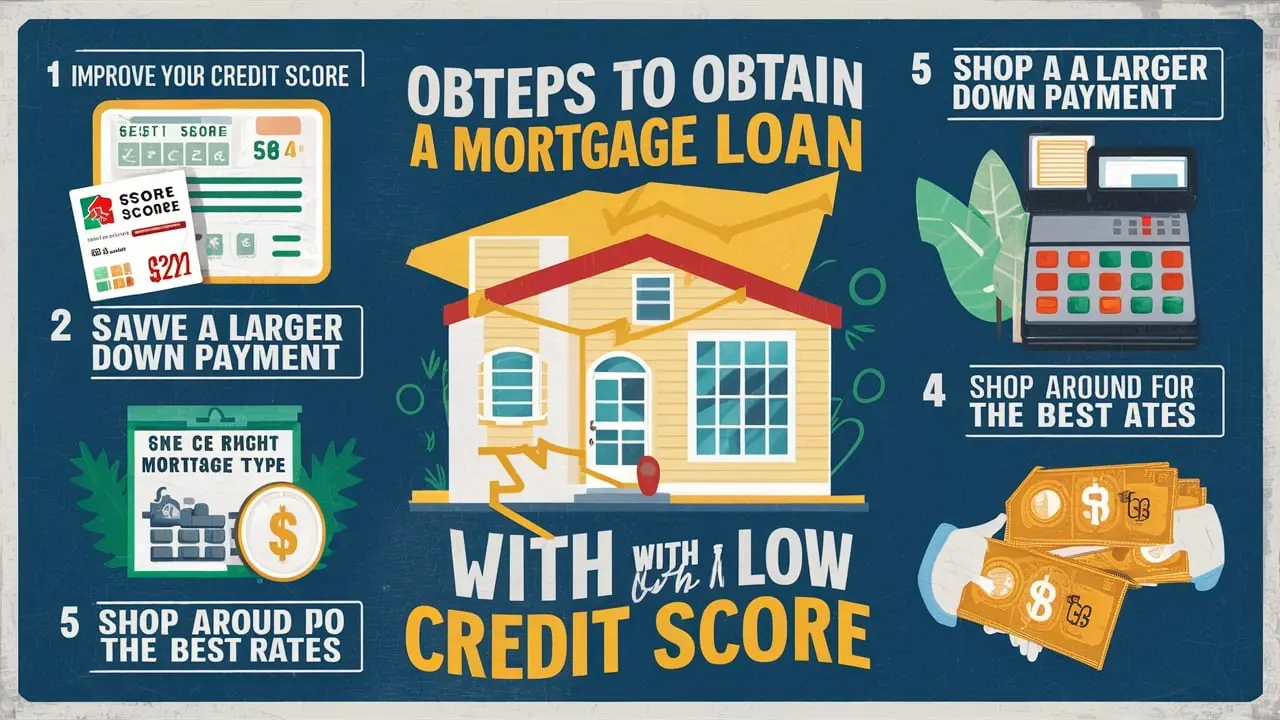-
Posted on: 23 Aug 2024

-
Applying for a loan with a low credit score
It is very challenging to get approved for a mortgage with a low credit score, but it is not impossible to do so. As much as you might have a low score below 620 certain programs and guidelines may help you qualify. It begins with knowing what mortgage lenders focus on and moves to the next step of improving the chances for approval.
Check Your Credit Report
The first step of the course of action is to go to AnnualCreditReport. Com and obtain a free credit report. Scan it for negative items that may have been lowering your score. If you note some errors, then you should engage the credit bureaus to challenge them and have them rectified. This can improve your score. Also, make sure to review those accounts that are nearing the reporting period so that they can’t be reported to the credit bureau. Paying those could also help enhance your credit.
Pay Down Debt
Creditors, therefore, expect you to prove that you are a responsible borrower of credit. Pay your bills on time to avoid late fees and ensure your balances are as low as possible. This comprises credit card balances and other balances that are reported to the credit bureaus. It is also advisable to pay off and close credit card accounts that you no longer use. Reducing your debt liabilities helps you become a less risky candidate for new credit.
Become an Authorized User
You can request a family member or a friend with good credit score to include you on his/her old and active credit card account. This can be beneficial to your credit profile as you can leverage on their long credit history of positive payment. But be sure they follow good credit card behavior if you go this authorized user way.
Choose Federal Loans
It is also worthwhile to mention that the range of special mortgage programs for low credit score borrowers is rather wide. FHA, VA, and USDA loans are guaranteed by the government and accept scores as low as 580 with at least 3. 5% down payment. These programs also allow you to roll your closing costs into the loan amount. As a result, you will not have to provide as much cash at the onset as with other conventional loans. So long as you provide a down payment of 10%, Fannie Mae also endorses loans to borrowers who have a credit score of as low as 620.
Improve Other Areas
While your credit history is more important, lenders also consider your debt, income, assets, and employment. Lack of funds for closing costs or being job insecure is not welcome when applying for a loan. However, this can be offset by laying down a bigger down payment from verifiable savings or by demonstrating good long term job continuity. Additional factors include meeting or going above program guidelines on assets, reserves, and debt-to-income ratio standards boost your chances too.
Add a Cosigner
The possibility of meeting qualifications may be easier if you apply with a cosigner with a good credit score and financial standing. The cosigner also accepts the responsibility for the mortgage in equal proportion to the primary borrower. Thus, they combine their credit, assets, debts, and income with yours for mortgage consideration. Just remember, they will remain legally bound until you convert the mortgage into your own, or you decide to sell the house.
Shop Multiple Lenders
They all have their criteria involving credit scores and debt-to-income ratios. Comparing rates and qualifications with different mortgage companies increases the possibility of finding one who is more flexible to a low-score borrower. Expanding the next helps increase the chances of approval. It also opens up more opportunities to go through a mortgage broker that has access to both lender programs and portfolio loans.
Ask About Exceptions
If you have been steadily employed in the same position for years or if you have enough savings, then highlight this in your application. Occasionally, the need will be flexible with the credit scores as long as there is a proper down payment from the borrower or other factors compensate for the low credit scores. One should always discuss with the underwriters whether such positives can outweigh your bad credit report.
Dispute Application Denials
If you have been a victim of unlawful mortgage denials, you have legal remedies under the Equal Credit Opportunity Act and the Fair Credit Reporting Act. Thus if you feel an application rejection is due to wrong, unverified, or outdated information then they should immediately file a written protest. Lenders then either approve your application, recheck the details for accuracy, or give reasons that would validate the denial if it was wrongful.
Improve Your Score
Last but not least, it is important to keep a check on your credit score and work on improving it before applying for credit again in the future if required. Removing negative information, paying off debts, or opening new positive accounts can take three to six months to increase scores. Thus, afford yourself some time to undertake credit correction measures derived from the research and earlier application experiences. Therefore, remain focused and do everything possible to increase your chances of qualifying the next time you apply.
Unlock better loan rates with a higher credit score—dial (888) 803-7889!











